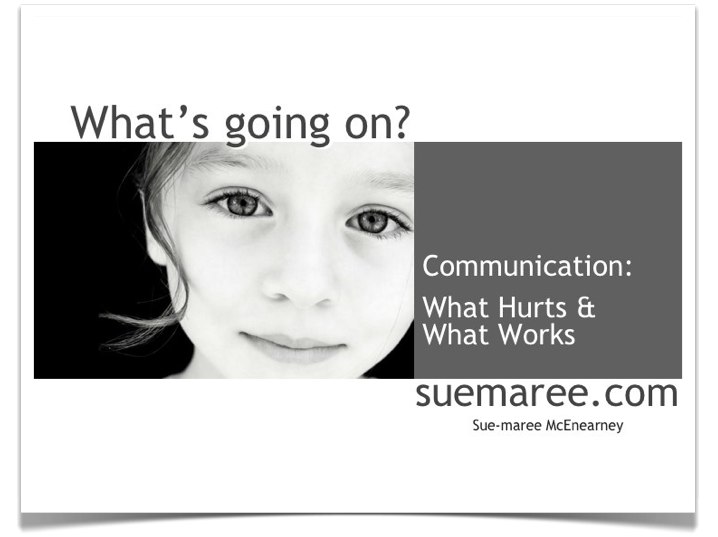
A MAJOR problem in communication is POWER PLAYS.
When people are trying to manipulate/coerce/force US to do what THEY want us to do... they're using POWER PLAYS.
power play: |ˈpou(-ə)r| |plā|
tactic used to manipulate/coerce/force people to do what we want them to do, regardless of what they want (or would want if they knew the reality of the situation).
For example;
Discounting, Judging, Dictating, Evaluating, Manipulating, Diverting, Confusing, Avoiding, Excluding, Deceiving, Guilting, and Intimidating.
Here’s some examples of these power plays in action;
Discounting
Discounting that a problem or options;
* even exists
* is significant
* can be changed at all, and/or
* can be changed by you!
Discounting - Existence:
“What problem?”
“There is no problem!”
Discounting - Significance:
“It’s not significant.”
“It doesn’t matter.”
“It’s not a big deal.”
Discounting - Possibility of Change:
“It can’t be changed.”
“The decision’s been made.”
“It’s out of my hands.”
“There’s nothing I can do about it.”
Discounting - Possibility YOU can Change:
“There’s nothing you can do about it.”
“You can’t change it.”
“You’re stuck with it.”
Judging
Sitting in judgement of others based on what the ‘judge’ considers;
Right/wrong, good/bad, acceptable/unacceptable appropriate/inappropriate.
“You’re wrong!”
“You don’t do it like that!”
“You’re right!”
“You did the right thing!”
(according to me!)
Dictating
Dictating to people what to do, what they ‘should’ do, and how to do it.
Includes; Setting limits, making rules and decisions, dictating permissions & injunctions. (what people ‘can’ and ‘can’t’ do).
“Just do it!”
“Do it like this!”
“You need to do this!”
“Yes. I’m telling you what to do!”
(and how to do it!)
Evaluating
Evaluating behaviour based on the judge’s assessment of how well people ‘measure up’ against criteria set by the judge.
Includes; Labeling, demonizing, idealizing.
“I’ve reviewed your ‘performance’ and evaluated it by my criteria...”
“I approve. That means you’re ‘good’.”
“I disapprove. That means you’re ‘bad’.”
Manipulating
Manipulating behaviour using coercion &/or force.
Includes; Praise & criticism, pedestals & putdowns, rewards & punishments.
“I’ll encourage behaviour I want,
and discourage behaviour I don’t, using
coercion, force, putdowns & pedestals, rewards & punishments!”
“If you do what I want, you’ll benefit.”
“If you don’t do what I want, you’ll suffer.”
Diverting
Diverting attention to avoid responsibility and accountability.
Includes; Deflecting, distracting, changing the subject, turning the tables, comparing, undoing.
“Oh! Look over there!”
“Well, what about you?!”
“I bought you a present!”
Confusing
Confusing people and/or the issue.
Includes; Abuse of logic, discrediting a premise, discrediting sources, feigning shock, feigning disbelief, interrupting, fast-talking, bombarding, ambushing, hijacking, embarrassing, humiliating, reframing, redefining, baffling, Socratic questioning*.
*badgering with questions to ‘force’ people to a predetermined outcome.
“So if X = Y then…”
“And that means...”
“So it’s not a question of A, it’s a question of B.”
“Isn’t it?!”
Avoiding
Avoiding people and/or the issue .
Includes; Evading, changing the subject, distracting with red herrings - including humour, ignoring, pretending not to hear, pretending to be asleep! withdrawing, hiding, being late, having ‘emergencies’.
“Later.”
“I don’t want to talk about it.”
“I’m not talking about this.”
Excluding
Purposely excluding people for personal gain.
Includes; Alienating and isolating using gossip, nastiness, sarcasm, arrogance.
“Did you hear what she did?!”
“He can’t be trusted.”
“He’s/you’re a @#$%!”
“You’re not invited.”
“Oh! You think so, do you?”
Deceiving
Lies of commission - fabricating information,
Lies of omission - withholding information.
Includes; Misleading with half truths, spinning, evasions, secrets, little white lies, bold-faced lies, whoppers, gossip, rumor, honesty passed off as a lie or a joke, over-promising and under-delivering, bait and switch, offering one thing and delivering another.
“I was at work.”
“It was only a drink.”
“You do X and I’ll do Y.”
(you deliver and they don’t!)
Guilting
Preying on a persons care and concern for others to create feelings of responsibility for what isn’t their responsibility.
Includes; guilt trips, shaming, obligating.
“After all I’ve done for you!”
“You should be ashamed of yourself!”
“You owe me!”
Intimidating
Intimidating with physical, verbal, mental, emotional, and financial, social harm or threats of harm.
Includes; ultimatums, sarcasm, criticism, insults, labels, putdowns, denigrate, embarrass, humiliate, frighten.
“You’re a ..... !”
“All or nothing”
“Take it or leave it.”
“You do, and you’ll be sorry!”
“Just try me (and see what happens)!”
“You don’t know what you’re talking about!”
eek?!
Where are others using power plays on us? And for those up for the challenge... Where might we be using power plays on others?
You're welcome to share your experiences here on the blog!
More on what’s going on and what we can do about it in future posts.
If you’d like more information sooner it’s all in the book:
What’s Going On? Communication: What Hurts & What Works
Read more about it here
Buy the book here
Next time… Compliance Capers.
Till then...
Wishing you happiness,

 Monday, March 22, 2010 at 4:52PM
Monday, March 22, 2010 at 4:52PM ![]()



